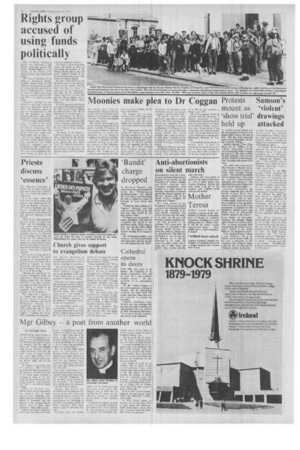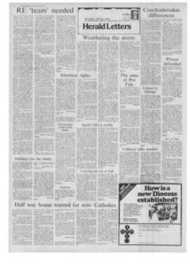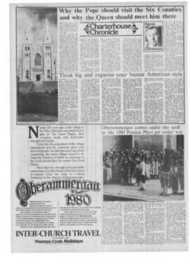Page 2, 24th August 1979
Page 2

Report an error
Noticed an error on this page?If you've noticed an error in this article please click here to report it.
Tags
Share
Related articles
`he Had More Effect On The Growth Of The Church In These...
Glenys Roberts Has Published The Commonplace Book Of...
Priest And Clubman
Generations Pay Respects To Alfred Gilbey
The Enduring Appeal Of Mgr Alfred Gilbey
Mgr Gilbey — a poet from another world
by Christopher llovvse MONSIGNOR Alfred Gilbey is not one of those characters, I'm afraid to whom all Herald readers will automatically warm. If I add, for example, that he used to follow the Trinity Foot Beagles while he was chaplain of Cam : bridge University, some will see what I mean. To these I would say: treat Mgr Gilbey as a sociological specimen if you want, but do not judge him till you know him.
On August 15, the Feast of the Assumption, Mgr Gilbey celebrated the 50th anniversary of , his ordination. Two days later, 160 of his former flock attended a thanksgiving Mass in the new chapel of Fisher House, the Cambridge chaplaincy. Later a dinner was held in the Hall of Trinity College.
Those are the bare facts. Behind them lies the personality that explains why so many eminent men, including Archbishop Bowen of Sotuhvvark, the Abbot of Downside and the Superior of the London Oratory should want to make their gratitude to Mgr Gilbey public. And he has always wanted to remain a private man. Last Friday he said: "I would rather have 160 dinners with each of you alone." When I went to see him at his home in the Travellers' Club, London, he did not want our conversation published. Nor will it be — he is a man who encourages others to act honourably.
But, for all this, Mgr Gilbey gives the impression of a showman, There is his dress. Any afternoon you might meet him in clerical frock coat and starched cuffs. Do you remember those round brimmed hats priests wore years ago? Mgr Gilbey still wears one with style.
No issue could more have shown his individuality of outlook than the background to his retirement from the Chaplaincy. He did not think women should use the Chaplaincy. The hierarchy were waiting upon his retirement to let them. So he retired.
Plainly, Mgr Gilbey was identified with the traditions of an all male society which knew what it liked and wanted to keep it. He introduced me to a book of reminiscences of Cambridge in the 1780s, a scandalous period, by Henry Gunning. Those times must be closer to his heart than these.
Coming from the Gilbey Family, is it any wonder he knows fine wine from poor? His energies have all been bent on keeping up the values he has inherited, instead of reacting against them, a more common pattern.
In matters of religious outlook too he is a complete apology for the tradition view. As an old man, he has permission to celebrate according to the Tridentine rite, and he uses it. To say Mass he travels across London by public transport, before 7 am.
Age has given him an ascetic air. His head is chiselled, as they say. His fingers are finely formed, It cannot be denied that he is a sincere mart. That is damning with faint praise perhaps. Julian the Apostate was sincere. Mgr Gilbey is an anomaly. He is unworldly both because he is a Christian and because the world has left his principles behind.
Last Friday he stood up in Trinity's Hall to speak to his dinner-jacketed hosts who clapped and banged on the tables at the right places. He stood beneath the portrait of Henry VIII that presides over the College, just as Archbishop Lefebvre stood beneath the painting of Henry VIII in Chelsea Town Hall at his latest round of illicit celebrations.
Both are men of their country. Lefebvre the hard legalist rebel, Gilbey the aristocratic eccentric individualist.
As Mgr Gilbey spoke, it became clear he was a poet. That is what makes the difference. Edith Sitwell had a theory that only eccentrics were true poets. Mgr Gilbey has proved it.
blog comments powered by Disqus











